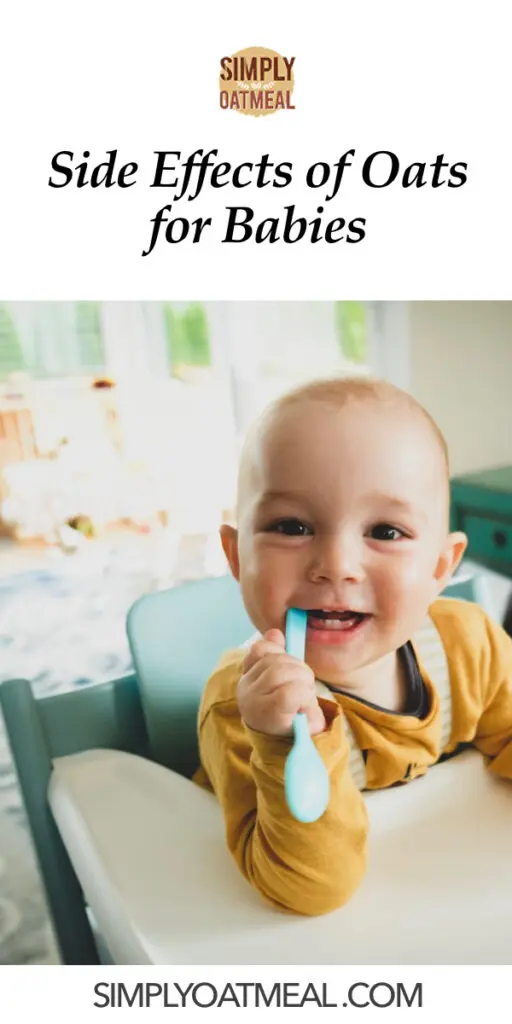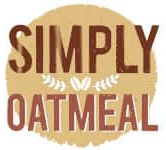Whole grain oats are minimally processed and wheat free, which is the common concern for many dietary reactions. With that being said, there are a few side effect of oats for babies that should be observed the first few times that infants are being introduce to oatmeal
In general, oats are not really something to be feared for babies. Common side effects for babies eating oatmeal include allergic reaction, bloating, excitement or possible choking hazard.
Keep serving size and frequency within levels of moderation, and beware of oat side effects before you start serving oats to your baby on a regular basis.
Oats are a plant-based source for valuable nutrition including high fiber, low fat and plant based protein. No wonder oatmeal for babies is considered a valuable source of nutrition for growing infants.
Why is my baby crying after eating oatmeal cereal?
Oatmeal is known as a healthy food, and oatmeal cereal has even been recommended as a food for babies who suffer from aid reflux. Oatmeal cereal also has the benefit of being gluten free, so that eliminates the possibility of stomach irritation or other health issues related to an undiscovered gluten allergy.
However, oatmeal cereal might not be good for all babies. If your baby is crying after eating oatmeal cereal, it might be due to a normal issue like needing a nap or it may be an indication of something more serious.
Your baby may be allergic to oats. An allergic reaction to oatmeal cereal can cause the baby stomach pain that causes him or her to begin crying.
Though oats are naturally gluten free, they can sometimes become contaminated by gluten during processing, triggering an allergic response to gluten. To mitigate this issue, makes sure to always purchase certified oats that are harvested and processed in wheat free facilities.
Your baby may also have developed gas or a tummy ache. Try burping the infant to expel the gases and encourage the bloating to subside.

Can oatmeal cereal upset a baby’s stomach?
Although oatmeal cereal is a single grain baby food that is often recommended as an aid for the digestive system, it can in some cases upset a baby’s stomach. As mentioned earlier, this may be due to an allergy, probably to oats, though an allergy to a contaminant is not out of the realm of possibility.
Oat allergies can be very serious, especially in babies.
An oat allergy in a child or baby can lead to FPIES, or food-protein induced enterocolitis syndrome, which in turn causes side effects like vomiting, diarrhea, and dehydration; FPIES can also result in insufficient growth, and in some cases even starvation and/or lethargy.
Some oatmeal cereals may also contain ingredients like soy, which a baby’s stomach and digestive system may not yet be mature enough to handle. This can lead to gas or a tummy ache.
Baby poop after oatmeal cereal
Oatmeal is dense with protein and fiber. As a result it is very good for the digestive system. Oatmeal cereal is therefore very good for a baby’s digestive system.
Oatmeal cereal is easier to digest and gentler on a baby’s digestive tract than rice cereal (previously considered the best cereal for babies).
Furthermore, constipation is a common problem most babies just beginning to consume solid foods encounter. Oatmeal cereal may be a solution to this, as it actually promote passing stools.
Babies who consume oatmeal cereal instead of other cereals like rice cereal, which can cause constipation. may experience an increase in the frequency of their poops. They may be more solid and firm than when on a liquid diet, but will most likely still have a soft consistency.
The stools may also resemble digested food and/or undergo a color change. These results may be due to the oatmeal cereal or simply starting the baby on solid food after having been on a liquid diet thus far in their lives.
Baby throwing up after eating oatmeal cereal
Your baby may be experiencing vomiting after eating oatmeal cereal. Throwing up is not a good sign.
It may, as mentioned earlier, indicate an allergic reaction or FPIES. It may also be due to food intolerance, which is not the same as an allergy (food intolerance causes digestive problems without triggering a histamine response from the immune system, while an allergy does trigger the immune system).
Regardless, you should probably stop feeding your baby oatmeal cereal until you can figure out the issue or altogether if they continue to throw up each time they eat oatmeal cereal.
Vomiting can lead to dehydration, which deadly for babies, and there exists the possibility that whatever the vomiting indicates may also be fatal for the baby.
Baby allergic to oatmeal cereal
As mentioned previously, if your baby is crying, experiencing upset stomach, and/or vomiting after being fed oatmeal cereal, he or she may be allergic to oats, which may in turn cause food protein-induced enterocolitis syndrome (FPIES) in babies. Oat allergies are caused by an ingredient in oats called Averin.
There are other indicators that your baby is allergic to oatmeal cereal besides stomach and digestive issues. Other ways you can tell if your baby is allergic to oatmeal cereal include:
- skin that is blotchy and itchy
- red, irritated spots
- rash in or on the baby’s mouth
- nose that is runny or congested
- itchy, irritated eyes
If you notice these signs after your baby has consumed oatmeal cereal, you should cease feeding him or her oatmeal cereal and consult a doctor.
Seeing a medical professional is important in order to get a correct diagnosis, as cross-contamination with gluten products during manufacture may also cause these symptoms if the baby is actually allergic to gluten instead.
You can substitute other cereals or foods for the oatmeal cereal in the meantime until the issue is resolved.
Oatmeal in bottle choking hazard
So if you feed your baby oatmeal cereal, you may mix it with breastmilk or formula in a bottle when starting the baby out on solids in order to provide a sense of familiarity. Try starting out with oat milk when adding something different to a baby bottle.
Is putting oatmeal cereal, or any cereal, in a baby bottle really safe though? Putting any kind of cereal in a baby bottle poses a serious choking hazard.
This risk is caused by the fact that babies may not possess enough motor skills to safely swallow on their own, causing them to choke when trying to take cereal from a baby bottle. They can aspirate, or swallow, the cereal into their lungs.
The thicker consistency of cereal makes it too hard for babies to drink it down on their own. Therefore, it is best to use caution when putting cereal in bottles.
You can safely serve oatmeal cereal in a baby bottle if you follow adequate precautions. Use the bottle nipple with an adequate hole size, adjust the consistency of the oatmeal cereal so that it flows smoothly from the bottle and also make sure to feed the baby while he or she is seated in an upright position.
Oatmeal for Babies Side Effects: Final Thoughts
Oatmeal cereal offer a number of nutritional benefits and is good for babies to eat. The recommended age to start introducing oatmeal to infants is after six months old.
Oats are considered to be one of the best cereals for babies, and is often recommended due to being easily digestible and helping to mitigate acid reflux.
However, oats can be dangerous for babies if they are allergic to the whole grain. So keep an eye out for signs of an allergy in your baby, especially when you start to introduce the new food to their diet.
Resources:
- MayoClinic.com: Solids Foods — How to Get Your Baby Started
- Better Health Channel: Iron Deficiency — Children
- WholesomeBabyFood: Learn All About Oatmeal for Use in Baby Food Recipes
- BabyCenter: Food Allergies
- AskDrSears.com: Constipation
- Dr. Paul: Starting Baby on Solids
- WholesomeBabyFood: Learn About Infant Reflux and Introducing Solid Foods to a Reflux Baby
